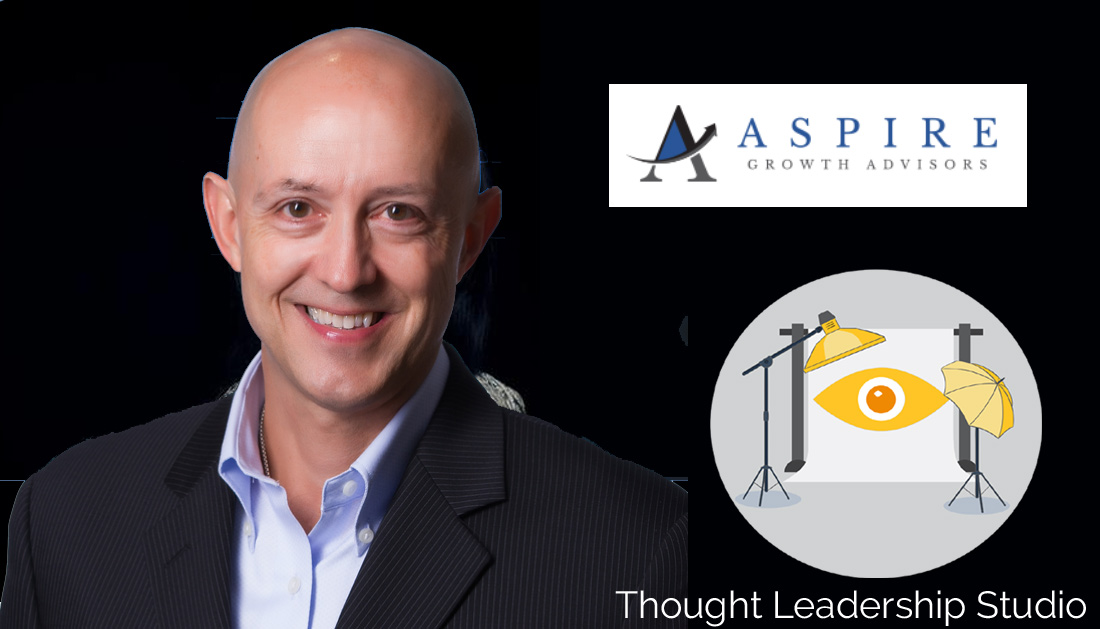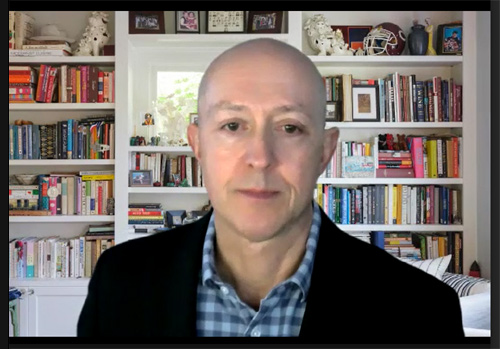Thought Leadership Studio Podcast Episodes:
Scaling Up with Herb Cogliano
Episode 62 - Scaling New Heights: Herb Cogliano's Insights on Leadership and Business Growth

#entrepreneurship, #interviews, #management, #marketingstrategy, #scalingbusinessgrowth, #thoughtleadership
Or Click here to listen or subscribe on appWhat this episode will do for you
:- Uncover the Secrets of Scaling Up: Dive into Herb Cogliano's unique insights on scaling businesses, learning how to identify and bridge gaps for substantial growth.
- Mastering Leadership Mindset for Growth: Explore the critical traits of effective leadership as outlined by Herb, including growth orientation, coachability, and strategic thinking.
- Transforming Company Culture and Values: Gain understanding of how aligning core values and purpose with business strategies can propel organizations to new heights.
- Navigating Through Business Challenges: Learn from Herb’s experiences in guiding companies through tough times and onto the Inc. 5000 Fastest Growing Company list.
- Leveraging Thought Leadership for Business Success: Discover Herb's approach to thought leadership in scaling up and how it reframes conventional beliefs about business growth.
- Effective Tools for Business Analysis: Herb reveals the importance of self-assessment and strategic tools like the 'Scaling Up' readiness assessment for business optimization.
Herb Cogliano.
In this episode, I interview Herb Cogliano, a seasoned CEO and founder of Aspire Growth Advisors.
In this insightful interview, Herb shares his journey of discovering Verne Harnish's "Scaling Up," which revolutionized his approach to business growth. He highlights key leadership traits vital for scaling up: growth mindset, coachability, strategic thinking, accountability, and effective communication.
Herb also touches on his success in helping clients achieve significant growth, emphasizing the importance of aligning business strategies with core values.
He invites listeners to explore resources like the "Scaling Up" book and his website for further learning and development. With his experience in leading companies to the Inc. 5000 list and creating award-winning cultures, Herb's insights are a must-hear for ambitious leaders and entrepreneurs.
Some of Herb's coordinates:
Curated Transcript of Interview with Herb Cogliano
The following partial transcript is lightly edited for clarity - the full interview is on audio. Click here to listen.
Chris McNeil: I'm Chris McNeil, with Thought Leadership Studio, and I'm sitting here across Zoom with Herb Cogliano, who is the founder and managing partner of Aspire Growth Advisors. And he has been a coach in scaling up practitioner for over 20 years. He's all about scaling up and welcome her. Glad to have you here.
 Herb Cogliano: Hey Chris. Thank you. Pleasure to be here with you and your listeners and talking about thought leadership. It's so important to scaling and I look forward to your questions.
Herb Cogliano: Hey Chris. Thank you. Pleasure to be here with you and your listeners and talking about thought leadership. It's so important to scaling and I look forward to your questions.
Chris McNeil: Fantastic. Well, to introduce our listeners to you, what's a story you can tell about what set you on this path of being a coach and facilitator to helping businesses or people scale up?
Herb Cogliano: Yeah, so family business, 54 years, I was second generation, we were doing the succession plan to that second generation. And as you know, every generation has their own challenges. We were growing, but we hit some speed bumps and we're having challenging, developing the right leadership, growing new and additional markets, competitive pressure. We were getting commoditized and one of the challenges was, Chris, we just didn't know, well, we didn't know what was it like to be twice as big or twice as many employees or twice as many products offering.
Working On the Business vs. Feeling Trapped In It
And somebody shared with me a book called Scaling Up by Verne Harnish and it was the playbook on how a few companies make it and why the rest don't. And in small mid-market companies today, most of us do not have a team of MBAs on our staff doing strategy full-time. We've got to figure it out ourselves. And what I learned from that book in its application to our company, it identified where the real gaps were to scaling. And then it gave me the simple tools to use with my team to release growth, to break through to that next level.
 And what it ultimately did for me, Chris was gave me more time to be working on the business for further growth opportunities versus being feel like I was trapped working in it, just trying to keep the lights on, if you know what I mean.
And what it ultimately did for me, Chris was gave me more time to be working on the business for further growth opportunities versus being feel like I was trapped working in it, just trying to keep the lights on, if you know what I mean.
Chris McNeil: I know exactly what you mean by that. That's Michael Gerber E-Myth, and that's a theme that keeps coming back to the podcast: working on your business instead of in your business.
So a book changed your life, is that right?
Herb Cogliano: It did truly did. We had an amazing journey. Our team developed best places to work, perennial culture of people loving to be a part of what we were doing together. And then we actually became an Inc 5,000 fastest growing company multiple years in a row, which was really an affirmation that what we were bringing to the market was accepted in such a profound and scalable way.
And those two together of doing well financially and doing good by the people and the employees we served was the most gratifying part of the journey for me.
Chris McNeil: Is that a big part of scaling up, of being mission centered that way?
Herb Cogliano: I think your purpose is a big part of any legacy oriented, long-term oriented company because purpose, a company without purpose solely focused on profit can only get so far. I think when you can combine a great purpose around a business model that is profitable, the sky's the limit of what you can achieve.
Chris McNeil: That makes perfect sense. And I think it was Peter Drucker who said something along the lines of profits aren't an enabling factor, they're a restraining factor in the sense that you have to be profitable, but there's a mission beyond that because it's all about what's important to the the marketplace, isn't it?
So what were the key awakenings that the book brought, taking you back to that time, if you can kind of step back into what was going on when you were in the legacy business and there's a concrete ceiling kind of feeling. Was it like that before?
Herb Cogliano: Well, you feel like you plateau, you get stuck and you've been 5, 10, 20, 50 million and you've been that size for a while ... and you're working hard ...
Chris McNeil: Yeah, concrete ceiling , comfort zone, the concrete wall we feel like we're pushing against until we find the door .. all kinds of metaphors that describes such a common occurrence in business when you're really pushing against the system and it's pushing back just as hard until you find that leverage point. So what were those key leverage points that the book gave you or that you brought to bear to the situation that are now important in your coaching practice?
Diagnosing Where the Issue Is
Herb Cogliano: So from a scaling up point of view, there was the ability to truly address the right problem that was holding you back. And we look at four major decisions that you need to get right around your people strategy, your execution capability, and your cash. And owners are not always good about self diagnosing. They think they have a people issue, but it's really a strategy issue or they truly think it's execution, but it's really cash.
 And so by educating them on how to diagnose where the issue is, we can then give them the education around the right tool to solve it. And that was really an epiphany for me because we didn't have the right people on our bus, our culture, our core values were not clearly defined or aligned between all the people that were in the company. We then had to put hiring methods around screening in more of those people with aligned values and purpose.
And so by educating them on how to diagnose where the issue is, we can then give them the education around the right tool to solve it. And that was really an epiphany for me because we didn't have the right people on our bus, our culture, our core values were not clearly defined or aligned between all the people that were in the company. We then had to put hiring methods around screening in more of those people with aligned values and purpose.
And then we had to be true to them. Would you really be willing to hire somebody for it, fire somebody for it, or take a true financial hit to defend it? And that's where the rubber meets the road. Chris, people are going to look at you and say, look, I love the core values on the wall. Your purpose sounds great, but are you truly living it?
Are you making decisions by it or is it all words? And when they see you defend it and stand up behind the people that do with you, your culture and your whole environment will change. And for the better.
Chris McNeil: Is that part of the coaching process? ... waking leaders up to an awareness of where they stand in terms of their stated values or do helping them articulate values in the way they may not have in the past by discovering within themselves and within the business as a system what they want to do for the world.?
Herb Cogliano: So think of your company's vision. An owner and a leadership team have this vision stuck in their head. You as the owner/founder, have one vision for what your future should be like. I'm your CFO, your head of sales. I have kind of my version of it, but imagine teaching them how to get it out of their head onto one simple sheet of paper, which is our one page strategic plan. So simple, so clear that I could share that with the five or 5,000 other employees that work with me.
And then within that vision, understand that your core values and purpose are an important element to a great vision. Why if you have a great strategy but a poor culture, employee turnover, instability, low morale, what are the chances of you executing any great strategy? Very small. So we want to educate the owners on how do we clarify the vision, keep it simple, and do they understand the importance of each element of a vision, which is the core values, purpose, the strategy, the way we go to market and what's unique and differentiated and ultimately the execution, how we deliver and achieve results towards division.
Aligning Vision and Values: Navigating Business Growth and Leadership Challenges
Chris McNeil: That's a great way to articulate it. And Herb, it looks to me like a set of levels that you need to get into alignment between the values, the vision, the execution, the actual behaviors of the business day to day. Are these things all in alignment?
What are the points of contact that you typically have when you start working with an organization? Now you're a scaling coach. So as a scaling coach, I guess you could be responsive to a specific leader within an organization or are you hired by individuals and working through them to the organization or are you hired to interact with the organization as a whole or does it depend on the situation?
Herb Cogliano: So I am normally hired by the owner or CEO of the company to work with them and their senior leadership team.
 And they've either had one of a few issues occurring. Number one in COVID, some companies dropped 30, 40, 50% revenue overnight and they were in a debt spin and they needed somebody with outside experience. I mean our 54 year history, I went through 13 different recessions as an owner, navigating and ultimately surviving all those things. So you learn a lot during that journey. But that's number one, somebody who's in a real, real tough spot, not fun.
And they've either had one of a few issues occurring. Number one in COVID, some companies dropped 30, 40, 50% revenue overnight and they were in a debt spin and they needed somebody with outside experience. I mean our 54 year history, I went through 13 different recessions as an owner, navigating and ultimately surviving all those things. So you learn a lot during that journey. But that's number one, somebody who's in a real, real tough spot, not fun.
Number two, they've kind of plateaued. They've been a 2 million, a 10 million, a $20 million company for a while and they just don't know how to get to the next level. Or number three, they are growing like a weed. They have this fire hose like just incredible growth and they don't know how to control it. How do I get more people? How do I take care of a hundred year over year growth with customers? I'm freaking out because of the rate of growth is so quick help.
So those are normally the three scenarios that we're dealing with and it's specifically with the ownership and their senior team.
The Art of Scaling: Mindset Shifts for Effective Leadership
Chris McNeil: It's interesting that your positioning - from what I'm seeing and hearing - is from the scaling up standpoint, which has a number of assumptions behind it.
I think in the business world, what we mean when we talk about scaling up is increasing capacity, is organizing around growth and it's getting past the kind of sticking points that we talked about.
And how much of is it about mindset, the mindset of the leadership that governs the organization?
Herb Cogliano: Well, it's interesting because separate from scaling up some of the work that I've been doing recently, Chris, is I produced a report in an assessment on the five traits of a high impact CEO and a leader. And that deals with the mindset. And what I learned from these traits are they're central to all the successful scaling up owners and leaders that I've coached.
 Number one is are they growth oriented personally, professionally, not only sales, but do they want to develop and grow people? Do they want to grow markets? Growth is a central mindset for them. Secondly, coachable learners, are they open-minded? Are they able to take constructive feedback and are they taking initiative for their own professional development and are they willing to?
Number one is are they growth oriented personally, professionally, not only sales, but do they want to develop and grow people? Do they want to grow markets? Growth is a central mindset for them. Secondly, coachable learners, are they open-minded? Are they able to take constructive feedback and are they taking initiative for their own professional development and are they willing to?
The third thing, strategic thinking, it is not something you just are born with. Do they have critical thinking mindset? Are they willing to look at the data? Are they willing to pick the high ground of where their market should be positioned and defend it and innovate in a way that's valued and distinctive from the competition? And not everyone can say that.
Fourth, are they accountable executors? Do they hold them and their team accountable for the results that they say they will deliver? Are they willing to top grade members of a team that are just not productive or producing after coaching and support has taking hold after a period of time and not everybody's willing to do that?
And then ultimately, are they an effective communicator? Are they transparent? Do they constantly update people so they know where they're at, where the business is at, and that everybody has clear line of sight for the work that they do? When you embody those five traits, mindsets to your word, I think you have an incredible leader and leadership team if you can get all of them to be like that at the top of the company.
Chris McNeil: That's a great definition of self-mastery in organizational capacity. Isn't it something for people to aspire to and calibrate against perhaps?
Herb Cogliano: Yes.
Chris McNeil: And do you find that usually the leaders you work with are already self-aware of the need for change in any of these areas or is it kind of a wake up call to start calibrating against this model?
Herb Cogliano: I think there are different stages of self-awareness. I would describe as a coach, I think our greatest gift is being able to assess and meet the leader where they're at, good, bad or indifferent and ultimately help them get to where they want to be.
And that's the head of a growing scaling up organization where they're working more in it than on it and helping them deliver what I simply call bigger futures for them and their team.
Chris McNeil: Right. I think you meant more on it than in it, but I know where you're going with that. So that's a very interesting point of view and I find it informative because I know my mental models about corporate growth largely come from the marketing side and utilization of marketing as a growth strategy.
Because if you can pull a few levers in marketing, you can enhance sales by 200, 300, 400% of what the same spend amount is generating. But if you don't have the capacity to serve what you're generating and now another piece of the puzzle, I see that your point of view forms really nicely is the fact that the internet has made this in the words of a recent guest, the visible leader phenomenon where the leader is transparent on social media communicating with the large audience of the company, Elon Musk's style for lack of a better analogy.
And they're having to upgrade their communication and marketing skills to fit the way that consumers learn about companies now. So I see even looking at it from marketing point of view, it's all kind of one whole, isn't it? Or how do you see the levers of growing capacity to serve versus growing, generating demand through marketing and coordinating those?
Herb Cogliano: Well, I think they're complimentary and both vitally important - one without the other won't work. It's almost like the goose and the golden egg. You have this wonderful goose producing golden eggs, but if you don't feed it, bathe it, take care of it, the goose dies in no more golden eggs. So marketing is like the golden egg that keeps being delivered, but if we don't take care of it, the execution part, the maintenance part, then you'll lose the goose in everything that comes with it.
I think they're very important, but I think Chris, to support your comment, a lot of owners in their leaders have not got right the marketing initiatives, the marketing thought leadership to be that type of leader in their market segment. And that's why they're not having this incredible front of funnel growth that you and I would love for them to have. It's absolutely a bigger challenge for most that end versus execution, but at scale, they're both challenging. If I have a small practice, I have 20 clients, yeah, I have the occasional fire I got to put out, but for the most part they're happy.
That's one thing. But turn on the marketing spigot and you give me a thousand customers in the next year, I'm going to have some execution challenges keeping up and delivering on that.
Chris McNeil: Absolutely.
Herb Cogliano: It's a good problem to have, but most people can't figure out how to get a thousand more clients in the door next year. We got to help them there first.
Chris McNeil: Sure, sure. Well, I mean, if you do get the marketing without the operations and you have the overshoot and collapse thing, when the marketplace figures out you can't serve them, it automatically close the spigot a little bit. This is fascinating.
I just love the mindset of growth and I like what we were talking about in the beginning about the mission and the values and how much of it is about waking up the leaders higher values, the difference you'd like to make in the world, even if money wasn't an issue. Sure, everybody wants to be rich and there's nothing wrong with lots of money. You can do lots of good with it and it is how society measures you in a lot of ways too.
Now, good or bad, but there's a mission beyond that. And there's this thing about seeing where you can through your business, as in Drucker's terms, an organ of society makes society better for everybody. How much is your work about waking that up within the leaders to touch into that sense of positive vision to do good for everyone through their organization?
Herb Cogliano: So Chris, one of the other activities that I get to do, and I'm very, very fortunate, is I'm the head professor of the Scaling Up Master's business course. So we're teaching companies from all over the world that want to come in and take the course, learn the curriculum, get the tools separately from the coaching practice, and we just had our closing cohort session today on the course, and we have a new one starting next week, but in the final session we talked about our purpose and our values and I said to a CEO, have you found your emotional connection yet to your purpose?
And he said, well, I think so, but not yet. And I said, well, our job is CEOs, is to find that purpose that would help me be emotionally connected, bought in, engaged. And then my second most important job is helping the people on my team find their emotional connection to it. And the way we do that is you have to have stories and specific people and times where, and I guess I go back to stories, you need a specific person in a story that you can be emotionally connected to why that purpose is so important to you.
And that's really important that we help them do that as a coach. Once we help them do it, then they're very good about helping the rest of their team do it. And I had one recent session with a coach, or I'm sorry, with a client in Australia that runs a small fabrication shop, and he was talking about his purpose and I said, do me a favor, give me a story. When you think of your purpose, who are you really thinking about? And then he pointed to his org chart and he goes, I'm thinking of that person right there.
And I said, what's his name? He gave it to me and I said, well, what's the story? And the story almost brought a tear to my eyes. I couldn't believe how important that person was to why this owner was doing the business that he was doing today. Even with all the hardship, that story was fuel for that owner to walk through the fire to make sure his company is going to be successful. That's the power behind that type of work with the leadership team.
Chris McNeil: That's awesome. I love that stories really bring things to life. They, our brains are just wired to, on an unconscious level, have stories kind of soak in and impact us. And so putting things into context and trying to draw out some threads that are especially relevant to our audience as the audience advocate as best I can be.
How do you see this role of being a strategic thought leader of leading your marketplace to new thinking about what you do, a different model that satisfies the audience's values, your marketplace's values at a higher level because you're teaching them how to think you might have an innovation, but sometimes you have to leave the audience to a different point of view in order to best appreciate the innovation happens through this kind of communication. How do you see the relationship between that point of view and what you do with helping an organization as a whole scale up?
Herb Cogliano: Let me see if this makes sense, Chris, and thank you. I appreciate the question. The people your listeners are speaking to may have a current paradigm about an issue. And I'll give you an example. Most business owners feel like if they work really hard and smart, they're going to have a scaling up success. Would you agree?
Chris McNeil: Absolutely.
***************************************
The transcript is lightly edited for clarity and is a partial transcript- the full interview is on audio. Click here to listen.
***************************************
Free Stuff and Offers Mentioned in Podcast
***************************************
***************************************